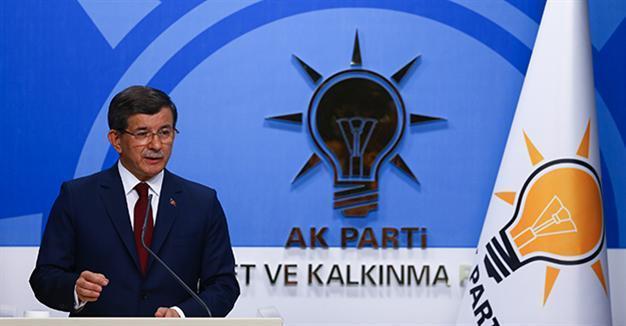EU 'unsure' what Davutoğlu exit means for Turkey migrant deal
PRISTINA/BRUSSELS - Reuters

The European Union is "unsure" how the departure of Turkey's prime minister will affect the deal he struck with the EU to curb migration, the EU's foreign affairs chief said on May 5, as Brussels watched events in Ankara with unease.
"It's a bit too early to define if it will have implications and in that case of what kind," Federica Mogherini said during a visit to Kosovo after Turkish Prime Minister Ahmet Davutoğlu announced he was stepping down.
"We will obviously discuss this first of all with the Turkish authorities and define together how to move forward."
Other senior European officials were reluctant to be drawn on the departure of Davutoğlu, whom many found more engaged and flexible in negotiating on the migrant crisis than the President Recep Tayyip Erdoğan - though one said bluntly it was "bad news".
"This is up to the Turks," an EU official said, echoing others who were anxious not to be seen to meddle in others' affairs.
"We lived up to our end of the deal," a third EU official said, noting the European Commission had delivered on May 4 on a key part of its bargain struck with Davutoğlu in March.
The EU executive has asked EU states to lift visa requirements for Turks by July, something Davutoğlu portrayed to Turkish voters as a key achievement in return for Turkey taking back any migrant or refugee reaching the Greek islands. Other parts of the deal have yet to be implemented, however.
A fourth senior EU official stressed to Reuters that although Davutoğlu, widely seen in Brussels as a more amenable, moderate negotiating partner than Erdoğan, had clearly taken the lead role on the migration deal, the president also backed it.
"The agreement was with Turkey, not Davutoğlu," the official said. "Erdoğan was also involved."
Migration dealIn recent weeks, arrivals in Greece have fallen to the dozens a day, from thousands last year. Nearly a million people, many of them refugees from the Syrian war on Turkey's border, made the short crossing in 2015 on their way to Germany - a movement that has set EU states against each other and the Union into a crisis that it is still far from resolving.
Turkey has warned that it could walk away from its agreement if Europeans do not make good on promises. Visa liberalisation is still subject to approval by governments and EU lawmakers who take a dim view of Turkey's human rights record.
Promised EU funds to help Turkey care for 2.7 million Syrian refugees are not all in place yet. Europeans have yet to agree to take in significant numbers of refugees direct from Turkey.
And a pledge to open new elements of Ankara's long-stalled EU membership negotiations is also still to be fulfilled.
Nonetheless, NATO member Ankara and its European neighbours have few options but to maintain close relations.
"The Europeans have no alternative but Turkey to try to deal with the refugee crisis," said Wolfango Piccoli, head of research at Teneo Intelligence.
European leaders have been divided lately in their approach to Turkey, with some critical of German Chancellor Angela Merkel for seeking Erdoğan's help to stem the flow of migrants. Others argue that even without Turkish help, the EU can control migration by better organising affairs in Greece.
By the same token, some European leaders believe that for all his insistence on his ability to forgo help from Europe, Erdoğan too has a strong interest in closer ties at a time when Turkey faces major problems with its regional neighbours and tense relations with both the United States and Russia.
 The European Union is "unsure" how the departure of Turkey's prime minister will affect the deal he struck with the EU to curb migration, the EU's foreign affairs chief said on May 5, as Brussels watched events in Ankara with unease.
The European Union is "unsure" how the departure of Turkey's prime minister will affect the deal he struck with the EU to curb migration, the EU's foreign affairs chief said on May 5, as Brussels watched events in Ankara with unease.